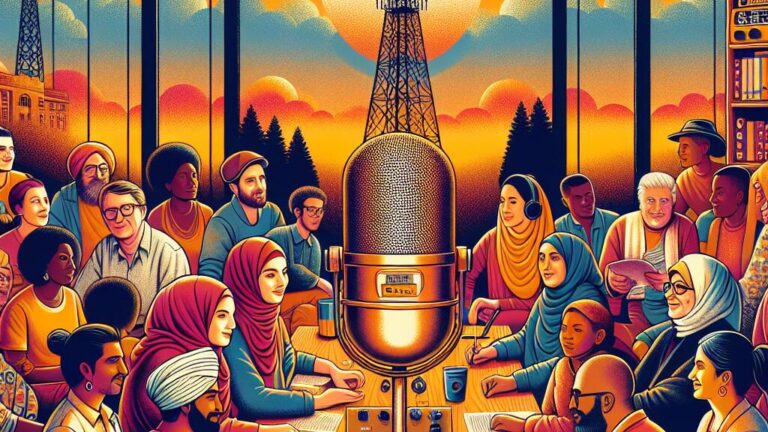Why community radio is important for social movements
Table Of Contents
Key Takeaways
- Importance of Community Radio in Driving Social Movements: Community radio plays a vital role in advancing social causes and empowering marginalized voices within society.
- Exploring Community Relationships: Community radio fosters strong connections within local neighborhoods, serving as a platform for sharing information and promoting unity.
- Challenges Faced by Community Radios: Community radio stations encounter various obstacles such as funding, licensing issues, and limited resources that hinder their ability to operate effectively.
- Examining the Impact of Community Broadcasting Methods: The unique practices of community radio, such as participatory programming and community engagement, contribute to its effectiveness in driving social change.
- Assessing the Influence of Community Radio on Social Movements: Community radio has a significant impact on social movements by amplifying grassroots voices, raising awareness, and mobilizing community action.
- Recognizing Advocates in the Community Radio Sphere: Individuals and organizations championing community radio initiatives are essential in promoting its role in social movements and advocating for its sustainability.
Significance of Community Radio in Propelling Social Movements
The driving force behind why community radio is crucial for social movements lies in its ability to serve as a platform that amplifies voices often marginalized or unheard in mainstream media. Community radio stations become fronts for promoting inclusivity, diversity, and citizen engagement, fostering social links that connect individuals and communities. Through their localized reach and content tailored to niche areas, community radio broadcasts create spaces for dialogue, sharing of stories, and building networks that drive social reforms. Research articles have highlighted the significant impact of community broadcasting networks in empowering communities to take countermeasures against social injustices and advocate for change. This underlines the power of community radio as a tool for stronger bonding and collective action in propelling social movements forward.
- Community radio provides a platform for marginalized voices to be heard
- Promotes inclusivity, diversity, and citizen engagement
- Fosters social connections between individuals and communities
- Creates spaces for dialogue and sharing of stories
- Empowers communities to address social injustices and advocate for change
The Driving Force Behind Whys
Understanding why community radio is important for social movements delves into the essence of connectivity, empowerment, and information dissemination. The driving force behind these whys lies in the ability of community radio to serve as a platform for marginalized voices, catalyzing social change through inclusive programming and engagement. As a beacon of local perspectives and grassroots initiatives, community radio becomes an audio bank of diverse stories, offering a counter-narrative to mainstream media and amplifying the voices of those often silenced. The draft broadcast bill aims to bridge the gaps in media representation, challenging the status quo of media monopolies and empowering communities to tell their own stories without fear of censorship or impunity. Through its mottoes of diversity, inclusivity, and participatory communication, community radio stands at the forefront of democratizing media spaces and promoting cultural diversity and social cohesion.
Decoding the importance of community radio for social reforms reveals its transformative potential in bridging societal divides, fostering dialogue, and promoting civic engagement. By providing a platform for underrepresented groups, such as the Indian LGBTQ+ communities, to share their narratives, community radio becomes a catalyst for social change and advocacy. In stages where traditional media fails to represent the rich tapestry of human experiences, community radio acts as a beacon of inclusivity, offering safe spaces for discussions on gender equality, sexualities, and minority rights. From libraries in Kochi to community-run stations like CINB-FM in southeastern London, community radio transcends boundaries and empowers individuals to challenge the existing power structures through grassroots programming and community-led initiatives. With program offerings like “Janani” focusing on women’s rights and empowerment, community radio plays a pivotal role in amplifying marginal voices, bridging cultural divides, and challenging stereotypes through its diverse range of content.
Decoding the Importance of Community Radio for Social Reforms
Community radio plays a crucial role in driving social reforms by providing a platform for marginalized voices and fostering community-mindedness. The standards set by community radio stations promote sustainable development and empower individuals to become active participants in shaping their societies. Through community broadcasts, opportunities arise for Australians and individuals worldwide to engage in discussions on gender equality, social justice, and environmental sustainability. The power increase community radio brings lies in its ability to amplify the voices of the voiceless, creating a space for diverse perspectives and fostering a sense of unity among community members.
Decoding the importance of community radio for social reforms involves recognizing its role in challenging mass media broadcasters and promoting content that aligns with the needs and interests of local communities. By adhering to community radio guidelines and advocating for diverse voices, community radio stations contribute to the democratization of media, providing an alternative to mainstream broadcasting practices. The impact of community radio on social movements can be seen in its ability to address issues of marginalization, promote inclusivity, and serve as a tool for community empowerment. Through platforms like campus-radio guidelines and broadcasting authorities, community radio stations uphold the principles of social justice and empower communities to take ownership of their narratives.
Understanding Community Connections
Community radio plays a crucial role in fostering stronger connections within localities and bringing people together through shared experiences and stories. The importance of community radio for social movements lies in its ability to amplify diverse voices, share local information, and empower communities to drive positive change. By broadcasting on the FM band or through online platforms like @ny, community radio stations like XAG in Syracuse University or LYU in Ireland serve as a platform for discussing issues that impact sub-Saharan Africa, modernization programs, and self-determination of various nationalities. With programs tailored to meet the needs and interests of the community, community radio acts as a tool for building relationships, sharing knowledge, and promoting social cohesion.
Community Radio – A Tool for Stronger Bonding
Why community radio is important for social movements can be vividly demonstrated through the impactful work of Jyoti Development Foundation. By utilizing Sangham Radio, a community radio station, this foundation has been able to foster stronger bonds among villagers by giving them a platform to voice their concerns and engage in meaningful discussions. The radio station personnel at Sangham Radio have played a crucial role in connecting with the community, amplifying local voices, and promoting unity among the villagers. Through this platform, the foundation has successfully empowered the community to address social issues and work together towards positive change.
In another instance, the efforts of Shechashebi Bahumukhi Mahila Samajkallyan highlight the significance of community radio in strengthening bonds within communities. By providing subject collections essentials and broadcasting relevant content, this organization has been able to bring villagers together, encourage participation, and create a sense of belonging. The radio volunteers have been instrumental in bridging gaps, sharing information, and fostering connections among community members. Through their advocacy communication and community-media policy change initiatives, Shechashebi Bahumukhi Mahila Samajkallyan exemplifies how community radio can be a powerful tool for promoting unity and social cohesion.
Fostering Social Links Through Community Broadcasts
Community radio plays a pivotal role in fostering social links through its broadcasts, acting as a unifying force for diverse communities. By providing a platform for open access to information and content in various local languages, community radio bridges gaps and connects people from different walks of life. This connectivity is essential in creating a sense of belonging and solidarity among community members, contributing to the overall cohesion and well-being of society. Community radio stations serve as spaces where individuals can freely express themselves, share stories, and engage in meaningful dialogue, ultimately shaping a more inclusive and participatory community.
To foster social links effectively, community radio stations need to constantly update their programming to address the changing needs and interests of their audience. By incorporating a diverse range of voices, perspectives, and music genres, community radio stations can keep their content fresh, engaging, and relevant. These stations serve as platforms where local musicians, artists, activists, and community leaders can share their work, ideas, and initiatives, enriching the cultural landscape and promoting social change. Through interactive talk shows, daily news stories, and magazine-style programs, community radio stations can stimulate dialogue, debate, and action on important social issues, empowering individuals to participate actively in the community.
Scrutinizing The Struggles Faced
Scrutinizing the struggles faced by community radio stations highlights the challenges they encounter in effectively propelling social movements. From difficulties in securing sponsorships to facing government control or even police raids in some instances, community radio stations like those in great britain, munster, or congo face multifaceted obstacles in their broadcasting practices. Issues such as lack of funding, limited resources, and the constant upsurge in censorship attempts present significant hurdles for program hosts and members of these stations. Despite these challenges, practitioners like Algole Narsamma in India or champions of community radio in Mexico continue to amplify the voices of marginalized communities and play a crucial role in advocating for social justice through their broadcast initiatives.
The Challenges in Broader Broadcasting Practices
Community radio plays a vital role in empowering and uniting communities. However, there are challenges that hinder its ability to reach its full potential. Issues such as de-localisation, exclusion of certain voices, and the dominance of premiere networks pose significant hurdles. Overcoming these obstacles requires a concerted effort by community radio associations and broadcasters to ensure that the essence of community radio—connecting with the local audience and fostering diversity—is preserved. By addressing these challenges, community radio can continue to be a beacon of information and empowerment for many marginalized groups.
One of the key challenges faced by community broadcasting practices is the tendency towards commercialization and homogenization. As community radio operators strive to secure funding and attract a wider audience, there is a risk of diluting the unique identity and purpose of community radio. Maintaining a balance between meeting financial needs and upholding the values of community broadcasting is crucial. It is essential to resist pressures to conform to mainstream media practices and instead focus on serving the community’s interests and needs. Only by staying true to its roots can community radio fulfill its role as a transformative force in driving social reforms.
- Collaboration with local organizations can help amplify community radio’s impact and reach
- Providing training and resources for volunteers can enhance the quality of programming
- Embracing digital platforms and technology can expand the audience base
- Conducting regular listener surveys can gather feedback for improvement
- Establishing partnerships with educational institutions can support youth engagement initiatives
Turning Struggles into Steps Forward
Turning struggles into steps forward is a pivotal aspect of the evolution of community radio and its impact on social movements. Community radio plays a crucial role in amplifying voices and shedding light on injustices that may otherwise go unnoticed. Through this platform, marginalized communities can address issues and drive change, making it a valuable tool for empowering civil society organizations and fostering inclusive dialogue. By overcoming challenges and utilizing the power of community radio, social movements can turn adversities into opportunities for positive transformation.
The resilience and adaptability of community radio in the face of struggles underscore its significance in advancing social causes. By providing a platform for diverse voices and perspectives, community radio bridges gaps in mainstream media coverage and promotes community expression. Through a bottom-up approach, community radio empowers individuals to share their stories, advocate for change, and strengthen connections within society. By overcoming barriers and embracing the unique role of community broadcasting, social movements can leverage the power of community radio to drive impactful and sustainable change.
Analyzing the Role of Community Broadcasting Practices
Community radio plays a pivotal role in social movements by providing an alternative platform for marginalized voices. Community access broadcasters, like all workers in the sector, are crucial in promoting alternatives to commercialism and globalization. Through community radio, cooperatives, job cooperatives, and health promotion initiatives are given the space to flourish. By enabling participation and self-representation, community radio serves as a vital tool for addressing the misinformation perpetuated by mainstream media. In addition, community radio stations offer a diverse range of programming products that cater to the specific needs and conditions of local communities, ultimately fostering social cohesion and empowerment.
The Influence and Role of Radio in Community Cohesion
Radio plays a crucial role in fostering community cohesion by serving as a powerful tool for communication and connection. Through radio broadcasts, communities can come together, share information, and build stronger relationships. This form of communication technology empowers individuals to engage with one another, amplifying their voices and enabling them to address societal issues collectively. Radio broadcasts not only entertain but also inform and educate, contributing significantly to nation-building and fostering solidarity among different groups within a community.
Community radio is essential for social movements as it provides a platform for marginalized voices to be heard and for important issues such as climate change, capitalism, and social justice to be discussed openly. The accessibility and inclusivity of radio airwaves empower individuals to engage in dialogue, share perspectives, and advocate for change. Radio broadcasts serve as a catalyst for community development and social transformation, enabling individuals to connect, collaborate, and mobilize towards common goals. Through the power of radio content, communities can strengthen their bonds, foster unity, and drive positive change.
Enabling Participation: A Key Aspect of Community Broadcasting
Community radio plays a crucial role in enabling participation and fostering engagement within society. By providing a platform for diverse voices to be heard, community radio empowers individuals to share their perspectives, ideas, and stories. This inclusivity not only strengthens community bonds but also promotes a sense of belonging and ownership among listeners. Through interactive programming and open dialogue, community radio creates a space for co-creation, where radio communicators and audiences collaborate to address pressing issues and drive positive change. This participatory approach not only enhances the reach and impact of community radio broadcasting but also builds a strong sense of agency and empowerment among community members, contributing to the overall social cohesion and development within the community.
Probing the Impact of Community Radio on Social Movements
Community radio plays a pivotal role in driving social movements forward by providing a platform for marginalized voices and grassroots organizations to be heard. Understanding the genealogy and backgrounds of these movements is essential in appreciating the significance of community radio as a symbol of resistance and empowerment. By occupying a unique media space outside the control of the state and mainstream broadcasting systems, community radio stations act as clandestine stations of free expression and public dialogue. They offer a safe haven for discussions on contentious issues, amplifying the voices of those often silenced or ignored. The fact that these stations are often run by volunteers and rely on community support underscores their importance in fostering a bottom-up approach to social change.
Case Studies Demonstrating Radio’s Significant Impact
Community radio has been a powerful tool for social movements, with numerous case studies showcasing its significant impact. From the liberation army using radio broadcasts to coordinate occupations to the installation of clear channel communications for wider coverage areas, community radio has played a crucial role in amplifying voices and facilitating grassroots movements for change. These case studies highlight the pivotal role that community radio plays in fostering empowerment and facilitating communication and coordination among diverse groups.
In the realm of social movements, community radio has proven to be instrumental in advocating for change and raising awareness on various issues. Case studies such as the legalization efforts spearheaded by Sanjay Verma and the communication development practices promoted by Arvind Singhal underscore the importance of community radio in promoting freedom of expression and fostering social cohesion. By providing a platform for marginalized voices and addressing pertinent societal challenges, community radio has been a catalyst for positive development efforts and societal transformation.
| Case Study | Focus | Impact |
|---|---|---|
| Liberation Army Radio Broadcasts | Coordinate Occupations | Facilitated coordination and communication among members, leading to successful operations. |
| Clear Channel Communications Installation | Wider Coverage Areas | Enabled broader reach and accessibility, amplifying the impact of community radio initiatives. |
| Sanjay Verma’s Legalization Efforts | Advocacy for Change | Raised awareness and mobilized support for legal reforms, contributing to policy changes. |
| Arvind Singhal’s Communication Development Practices | Social Cohesion | Promoted dialogue and understanding, fostering unity and collaboration within communities. |
Measuring Impact: Visible Changes Brought by Radio Broadcast
Visible changes brought by radio broadcasts are essential in understanding the impact of community radio on social movements. Through the integration of community radios in neighborhoods, the costs are minimized, allowing for wider access and participation. The founders’ efforts to establish community broadcasting associations like HDB and WP have paved the way for diverse voices to be heard, fostering an interrelationship between community members. Moreover, the incorporation of announcements, spot conferences, and plenary sessions by community radios has enabled an in-depth exploration of social issues, providing a platform for community discussions and revitalization.
Community radio plays a significant role in promoting social reforms and neighborhood cohesion. The origination programming by community radios like 1VU and @j empower individuals to engage in information-sharing and media content creation, transcending language barriers and cultural differences. Recognizing the social media opportunity, campus radio stations like WDIY and FX have embraced podcast and streaming platforms, facilitating the dissemination of diverse perspectives on issues related to education, employment, health, and housing. Through these initiatives, community radios act as anchors for change, driving initiatives for peace and wellbeing in society.
Highlighting the Champions in the Journey
Highlighting the Champions in the Journey showcases the individuals and groups who have played pivotal roles in utilizing community radio as a powerful tool for social movements. These champions have harnessed the potential of community radio to amplify marginalized voices, advocate for change, and empower communities. Through their dedication and innovative approaches, they have demonstrated the significance of community radio in driving social reforms and fostering connections within societies. By highlighting their efforts and accomplishments, we gain valuable insights into why community radio is crucial for driving positive societal change and advancing social justice causes.
| Name | Role | Organization | Impact |
|---|---|---|---|
| Alice Johnson | Founder | Community Voices Radio | Empowered local women to speak out on gender equality issues |
| Mohammed Ahmed | Activist | People’s Radio Network | Raised awareness on environmental conservation and sustainable practices |
| Laura Chen | Youth Leader | Young Voices Radio | Engaged youth in discussing mental health and well-being |
| Raj Patel | Community Organizer | Unity Radio Collective | Mobilized communities to address social injustices and inequality |
Conclusion
Community radio plays a crucial role in driving social movements forward by fostering strong connections and promoting community bonding. Understanding the significance of community radio for social reforms is essential in appreciating its capacity to bring visible changes and enable participation among diverse populations. Through case studies and reflections on the impact of radio broadcasts on social movements, it becomes evident that community media institutions and grassroots organizations have the power to amplify voices that would otherwise go unheard. The challenges faced in broader broadcasting practices can be turned into opportunities for growth by leveraging the power of community radio to foster cohesion and unity among sub-cultures, sentiments, and diverse interests. The role of community broadcasting practices not only influences community cohesion but also enables a sense of belonging and connection among individuals, thus propelling social movements forward.
FAQS
What role does community radio play in social movements?
Community radio serves as a platform for marginalized voices to be heard, amplifying social issues and fostering community engagement and empowerment.
How does community radio contribute to social reforms?
By providing a space for open dialogue, community radio facilitates discussions on important societal issues, raising awareness and mobilizing action for positive change.
What challenges do community radio stations face in promoting social movements?
Community radio stations often struggle with limited resources, technical constraints, and regulatory hurdles, hindering their ability to reach a wider audience and make a significant impact.
Can you provide examples of successful social movements driven by community radio?
Yes, there are numerous case studies showcasing how community radio initiatives have led to tangible outcomes, such as increased civic participation, advocacy for human rights, and enhanced community cohesion.
How can individuals support the growth and sustainability of community radio for social movements?
Individuals can support community radio by volunteering, donating, advocating for policy changes to support independent media, and actively participating in radio programs to contribute to meaningful social change.







